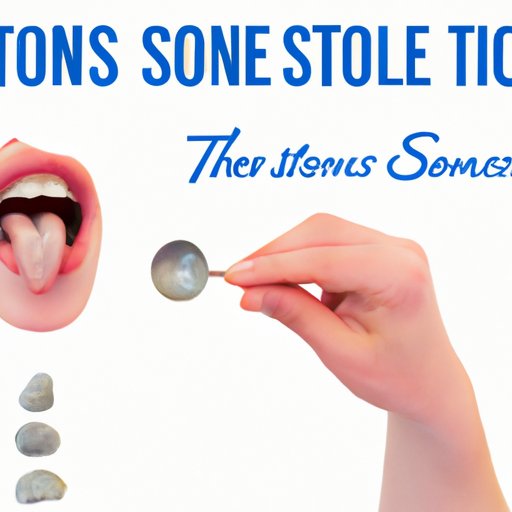
I. Introduction
Hidden tonsil stones are small, calcified deposits that can develop in the pockets of your tonsils. Although they are often harmless, they can cause bad breath, sore throat, and discomfort.
This article aims to provide useful tips and remedies for those struggling with hidden tonsil stones they can’t see. It will explore the causes, symptoms, and prevention of tonsil stones, as well as effective home remedies and when to seek professional help.
II. Symptoms and Causes of Hidden Tonsil Stones
Tonsil stones form when bacteria and debris accumulate in the tonsil pockets. They can cause bad breath, sore throat, difficulty swallowing, and swelling of the tonsils. Hidden tonsil stones are those that are difficult to see, often located deep in the tonsil pockets.
The exact causes of tonsil stones are unclear, but poor oral hygiene, chronic sinusitis, and frequent respiratory infections are believed to contribute to their development. People who suffer from tonsil inflammation or large tonsils are also more prone to tonsil stones.
III. The Importance of Good Oral Hygiene
Good oral hygiene is crucial in preventing tonsil stone formation. Regular brushing, flossing, and gargling with mouthwash can help to reduce bacteria and debris in the mouth, preventing them from accumulating in the tonsil pockets.
Experts recommend brushing your teeth at least twice a day, using fluoride toothpaste, and flossing every day to remove food particles from between your teeth. It is also important to use a tongue scraper to remove bacteria and debris from your tongue and gums.
IV. Home Remedies to Dislodge Tonsil Stones
There are several home remedies that can help to dislodge hidden tonsil stones. One of the most effective is salt water gargles, which can help to loosen and dislodge the stones. To make a salt water gargle, mix half a teaspoon of salt in a glass of warm water and gargle for about 30 seconds.
Apple cider vinegar is another popular ingredient used to treat tonsil stones. It contains acetic acid, which helps to dissolve the tonsil stones. Mix two tablespoons of apple cider vinegar in a glass of water and gargle for about 30 seconds.
Water flossers can also be helpful in removing hidden tonsil stones. They are designed to shoot a stream of water directly at the tonsil pockets, dislodging any debris or stones.
V. Seeking Medical Advice
If home remedies fail to remove the tonsil stones or if you experience chronic tonsil infections, it may be time to seek professional medical help. An ear, nose, and throat (ENT) specialist can perform a thorough examination and recommend the best treatment options.
Doctors can recommend medication, such as antibiotics or corticosteroids, to reduce inflammation and prevent infections. In some cases, they may recommend tonsillectomy, which involves surgically removing the tonsils.
VI. Tips for Preventing Tonsil Stones in the Future
Maintaining good oral hygiene is key to preventing the development of tonsil stones. This includes brushing and flossing regularly, using a tongue scraper, and rinsing with mouthwash. Drinking plenty of water and avoiding sugary or acidic foods can also help to prevent bacterial growth.
You can also prevent tonsil stones by avoiding smoking and reducing alcohol consumption, both of which can contribute to poor oral health and bad breath.
VII. Conclusion
Hidden tonsil stones can be a nuisance, but there are many effective remedies and prevention methods available. Maintaining good oral hygiene is crucial in preventing tonsil stones, but home remedies and medical assistance can also be helpful in treating them.
If you suffer from tonsil stones, try implementing some of the tips highlighted in this article to alleviate discomfort and improve your oral health.





